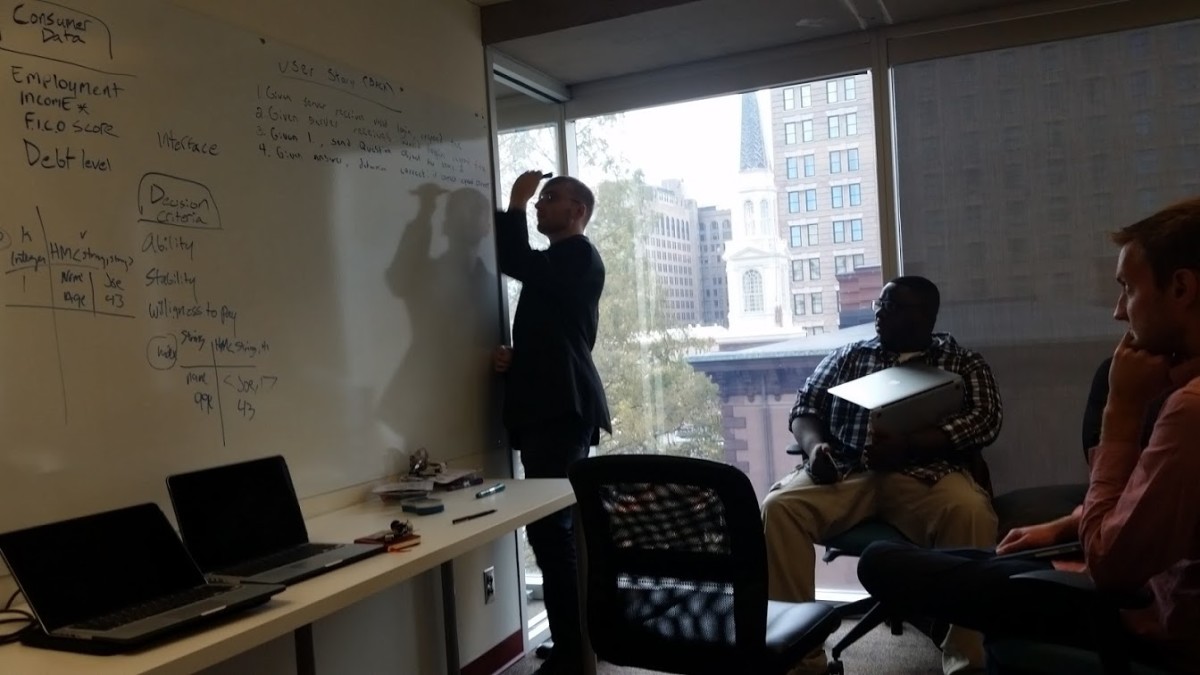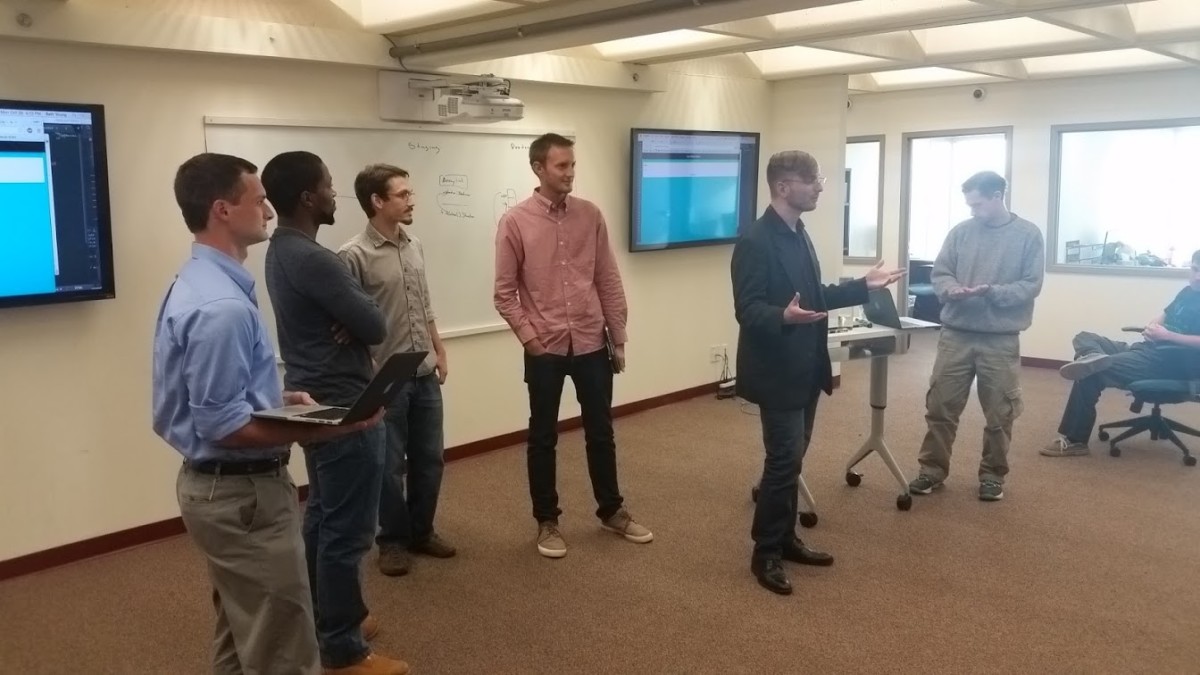It’s just past 3:30 on a Monday afternoon at Delaware’s brand-new web dev school, Zip Code Wilmington. There’s a flurry of incoherent chatter ricocheting through a small breakout room in the hallway left of the open classroom.
There are six murmurs in total — one for each twenty-something male huddled inside the space. Three are butttoned up in collared shirts. One is sporting a tight-fit Henley, another is adorned in a sweater that looks entirely too itchy for humans, and the sixth is donning a blazer.
There’s a focused, quiet chaos reverberating through the space, and the group is actually communicating strictly through unassuming mutters and pointing gestures. Other than the occasional affirmative glance and nod, there is minimal eye contact.
The door bursts open as a booming bellow breaks through the bustling banter.
“Twenty minutes.”
There’s a tinge of nervous playfulness to the tone of the voice, an attribute all but drowned out by sheer volume. Six heads pivot towards the door.
Tariq Hook enters the room smirking; the Zip Code instructor certainly knows how to command authority in a room — especially when that room is occupied solely by his students.
“If I walk back in here in fifteen, will you have something for me?”
Nods. Smirks. Sighs.
Hook laughs heartily to himself as he leaves the room. He might be all chuckles this afternoon, but Zip Code is no joke — it’s boot camp. From the school’s current class of 19 students, Hook has handpicked these six — Greg Furlong, Richard Sparks, Seth Young, Evan Maron, Gabriel Humphrey and Alex Brown — to work on developing an app for a local nonprofit today. The nonprofit requested a trivia app capable of prompting the user with timed multiple choice questions and the ability to store score data.
Here’s the catch: The six need to produce a deliverable product to Hook by 4:00 p.m. Besides breaking for a quick bite to eat earlier in the afternoon, the six students have been largely confined to the breakout room since 9:00 a.m.
Hook has been putting together select swathes of students to work on partner projects with community organizations for the past month. The projects are a badge of pride for Zip Code and a boon for organizations and their constituents, but the projects mean much more than that — they give Hook an opportunity to better determine whether or not his students are able to complete a very real project on a very real deadline.
The stakes are high. For the students, sure, but also for the school itself. Zip Code has to prove it can produce valuable dev talent.
With Hook gone, the chatter picks back up. It’s coherent this time — and sounds productive. It has to be, considering a nonprofit has been promised a functional app by the end of the day. These students aren’t professional programmers just yet. Having only completed six weeks of the 12-week course, they’re not impervious to making simple blunders.
“Something happened to our original model, because I don’t know where it is,” mutters one.
“This is the dumbest hack of all time,” responds another. There’s a void in the room as the conversation pauses. The silence is shattered by sets of fingers racing across keyboards. “Is this fixing it?”
“Why don’t we just set it to 45 and have it count down?” Despite the confident timbre of the suggestion, this is an interruption that returns a chiming “no” from three voices in perfect unison. It’s clear that these students have been together for 100 hours every week since the first week of September. They don’t butt heads often, but there’s a hint of quarrelsome mischief in their company, fittingly reminiscent of a wolf pup litter.
That means Hook is the Big Bad Wolf, and he realizes the importance of playing the part.
###
Rewind to 9:30 a.m.
The team is assembled and assigned the project. Hook remains present to provide guidance for the initial brainstorm, but does his best to seem invisible for the first few minutes. But it’s the beginning of class, and the project team still seems burned out from their individual night assignments. They’re slow to ponder possible infrastructural requirements for this particular assignment, and it isn’t long before Hook steps in.
“You know you have to deliver something by 4:00 at the latest,” Hook said, placing emphasis on the word “something.” He paused for a moment to assess whether or not the team is retained what he’s saying.
“It’s all about iteration,” he said. “Your real goal should not be to have something by 4:00. Your goal should be to have something before then, so you can pivot if you need to.”
From there, Hook breaks the group into halves — one to develop the back-end and the other the front — and advises them each to work as if the other group will fail to deliver on their assignment.
“Only make the things in the back-end be essential,” Hook barked, halfway out the door. “Most of your feature development should be on the front-end for this because that’s all the user is going to see.” Hook is halfway across the hall when he issues a fleeting reminder that the app needs to be delivered today.
“Tomorrow is a new project,” he belts from afar. “So is Tuesday. So is Wednesday. So is Thursday.”
###
It’s 10:20 when the door swings open once again.
Hook introduces the team to a pair of developers visiting from Chatham Financial. The pressure is on, now. These guys are here to scope out fresh talent. They stick around for the remainder of the hour to observe the students at work. Unfazed, the students trudge on. Now in their seventh week of the program, they’re accustomed to (and seemingly comfortable with) being put on display for devs from Zip Code’s sponsor corporations. They want those jobs just as badly as those devs want to recruit them.
That means the majority of the pressure is mounted on the shoulders of Hook.
He’s the educator entrusted with making sure this pilot class is prepared to succeed in the apprenticeships each student is placed into, and this is the kind of environment he wants them to adapt to. Is the intensity of today’s mini-hackathon what Hook wants the students to expect day-to-day working in a corporate dev gig? No, but this is boot camp, and Hook is the drill sergeant. The project is overwhelming by design. How this team performs in the face of intense pressure will in turn allow Hook to gauge his efficiency as an instructor.
This is just as important for him as it is for them.
It’s a few minutes past 4:00 now, and Hook directs the team to the front of the classroom to present their work to the rest of the class. As they show off their app, Hook’s jests and chuckles resonate with authenticity. Mission accomplished.
“You actually gave me a deliverable today. You handed me something. That’s big,” Hook beams, shedding his wolf costume, if for a moment. It’s temporary solace for these students. It’s not long before Hook returns to proper form.
“What is something you did today that you won’t do tomorrow? How will you improve on this process?” he asked the team. They teeter nervously. Yeah, they know what’s coming.
“Tonight, each one of you has to give me a spring app that pulls down a JSON API, then serves that up to an angular app.”
Nods. Smirks. Sighs.
Tomorrow is another day.
Join the conversation!
Find news, events, jobs and people who share your interests on Technical.ly's open community Slack

Delaware daily roundup: Greentech terms to know post-Earth Day; generative AI's energy costs; anti-AI deepfake legislation

Delaware daily roundup: Delmarva Power vendor stats; DelDOT's $15M federal grant; 50 best companies to work for

UD's STAR Campus gears up for a major addition in biopharma


